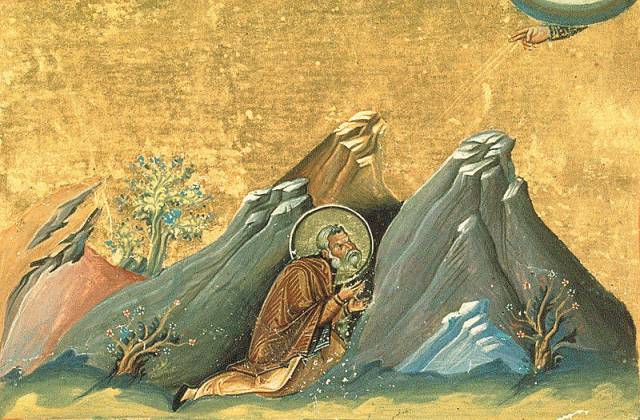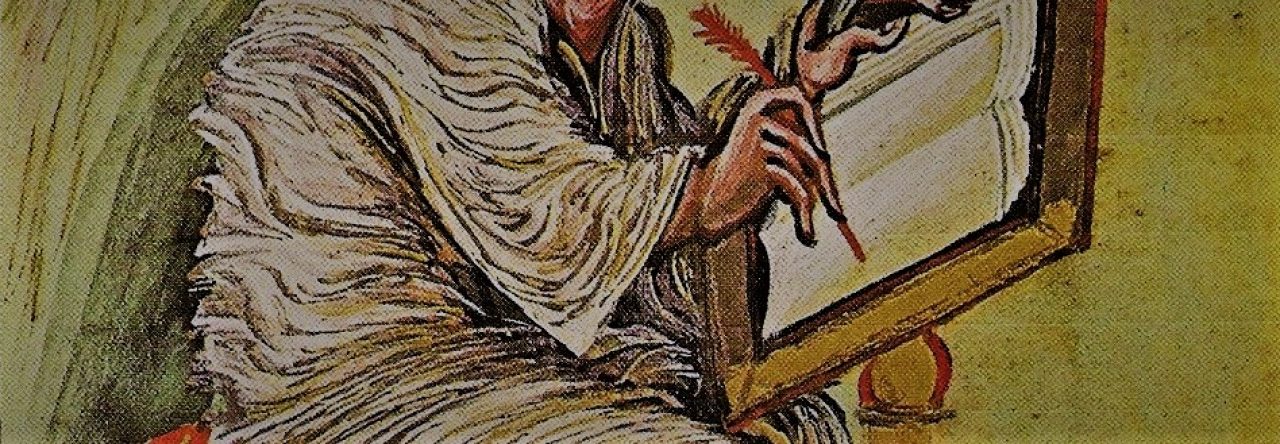Introduction added on 3/25/20 – I originally penned this blog in response to ideas I encountered on the internet and blog-o-sphere. This piece is a response to the ideas of my peers in that realm. That is the sole intent. I am questioning some of the ideas put forth by my peers. It is a challenge in that sense only. As I said even when I first penned this piece, I’m not advocating for rebellion at all on a higher level. In this article, I simply question the idea that recluses-saints somehow justify our current situation. Now maybe I’ve misunderstood someone’s intent; maybe I’m missing the point …
Let the reader understand, I’m just a nobody parish priest from nowhere. What do I really know? I’m not a great ascetic. I’m not a guru. I’m not some sort of deep spiritual guide. I’m a nobody. So why should anyone even listen to me? I hope that everyone will strive to evaluate what I say in the light of Holy Orthodoxy. This is a personal blog. I take full personal responsibility for what I write and say. I’m striving to offer it in a productive manner, as best as I’m able.
Begin original (slightly modified) post:
It seems, even in the Orthodox world, at least here in America, there is a growing quarantine of certain ideas. An atmosphere is being created that if one disagrees with certain statements, such a person is self-centered, egotistic, and cares nothing of others. In fact, it seems, that the impression is being given that such a person is possibly even rebellious. I believe this to be a dangerous trend.
Clearly, we are in a strenuous situation, for various reasons. I will state yet again, I’m not advocating for disregard of precaution whatsoever. I’m not advocating for rebellion. In the current situation and the responses being taken, we must have the ability to evaluate it and the spiritual response to it. My goal at current is to offer ideas for reflection and also an examination of ideas that I think are faulty. (As a side note, if the reader is concerned about actions being taken by clergy then write your Bishop, communicate with your priest. The clergy are to be servants of the people, not their lords.)
Great Lent, after all, is a time for deep reflection. Reflection entails asking questions. I’m striving to offer my reflections and questions in that spirit. In this post I will address two spiritual analogies that I have encountered from other contemporaries; I disagree with their presentation and use. In this post, I am addressing spiritual ideas.

Obviously, in this trying time for Orthodox Christians in America, we must all seek to salvage what we may. We can be encouraged by turning to the examples of the saints, as it should be. What concerns me is what seems to be a misapplication of these examples to some degree.
I will be rebutting ideas that I have seen in the writings of people on the internet I respect. I still respect them but I, at current, disagree with their application of certain events from the lives of the saints. In America, we have been trained to be polarized. This is very dangerous. And I believe I have been observing this in the Orthodox world. Now, I’m not a relativist. Two opposing ideas can’t both be right at the same time. Yet, let’s keep in mind that at current we are not talking about the fundamental dogmas of the faith. The situation is indeed complex, and I believe there is a proper response. I’m sure people read what I write and disagree. You are free to do so.
The first example I have encountered is from the life of St. Herman of Alaska. It contends that he was not a priest and almost never had the services in Church and yet angels were his companions. All very true and encouraging. This is not “social distancing” at all. And to use it as an example of such is, in my opinion, disingenuous. St. Herman was an ascetic recluse, which has nothing to do whatsoever with the current catch-phrase, “Social Distancing.” (Think about it, the phrase “Social Distancing” is double-speak. “Social” implies a lack of self-isolation and distancing. How we love these stupid phrases in modernity.)
The nearest Church to St. Herman was on Kodiak Island. St. Herman was a recluse, a unique vocation in the Church. He went into the wilderness freely, following the path of a vital and very particular vocation in the Body of Christ. This example may bring consolation in our situation but it does not by any means validate it. My concern is the attempt to validate current situations. Please, let’s offer comfort (maybe that is the intent) but our current situation is very different, difficult, and complex.
Furthermore, St. Herman encountered a time of “deadly sickness.” How a recluse responded during this time might actually bear more weight for our current situation. “An infection of deadly sickness and sores was brought by way of a ship from the United States to the island of Sitka and from there to the island of Kodiak. It began with a fever, intense runny nose and shortness of breath and would end in spasms: in three days the victim would die … During the whole time the sickness lasted, a whole month with gradual decline, Father Herman, not sparing himself, tirelessly visited the sick, begged them to be patient, to pray, to bring forth repentance, or to prepare themselves for death” (Prima Vita). The disease was extremely fierce on Sitka because there was no doctor and no medication.
Of importance is the fact that this Saint-recluse left his reclusion and home to serve. He did not stay at home fearing to spread the disease. And yes, I’m sure he took every precaution that he could as he ministered. His words to the Aleuts are, of course, most applicable to us. May this sacrifice inspire us.
The second example which I have encountered is how certain desert fathers would leave the monastery for forty days to pray in the wilderness. A noble example indeed. Yet, they were not forced into the desert, it was of their own free will. May their example gives us hope in our situation but it, again, does not validate our current situation.
Furthermore, in the life of St. Mary (which has been pointed to as an example because the monks of the Monastery where St. Zosimos lived had the above-referenced practice) this very vital phrase must be taken into consideration, “All went out into the desert and crossed the River Jordan. Only one or two brothers were left in the monastery, not to guard the property (for there was nothing to rob), but so as not to leave the church without Divine Service.”
That is, even though most of the brotherhood went into the desert to pray they left a few to make sure the services would not be stopped. Such was their value of the services. They did not leave the Church without service. Services continued even as they prayed in the wilderness. They understood that while their personal and very ascetic prayer was being offered in the desert, it was of the utmost importance that the Div. Services were being offered also. It was a package deal.
Once again, these examples may encourage faithful Orthodox, as they should, but they in no way justify, from the spiritual perspective, the forced isolation into which secular society is forcing people, even Orthodox. This isolation is accentuated by the limiting or closing of churches. In our current situation, we are responding to outside, many times, secular forces that are bringing pressure on the Church, and not to the overwhelming love for God to which the recluse-ascetics were freely responding.
Thus, my point is, the circumstances which inspired the recluse-saints are much different from those that are affecting us at current. I believe we should and may turn to them for inspiration as we face forced isolation, but I don’t believe that we should use them as a means to say, in basic, “it’s okay that we are not able to go to service, look at these saints! You’ll be just fine!” That is why I put forward the statement that the desert fathers and those in their vocation should not be used to justify our current tragic circumstances.
Spiritually speaking, we must have both personal and corporate prayer. We must strive to make sure that both are functioning rightly. Nothing can keep us from our Lord and ultimately all things will work for the good of those who trust in Him.
Maybe we have lost Services since, maybe, while we had them we did not value them as we should.
May the Lord have mercy.

Glory to God, Father!
LikeLiked by 1 person
Аминь. May the Lord have mercy. I completely agree with you Father… Here in Australia, by God’s Grace, things are getting stricter, limiting, but Glory to Thee O Lord, Glory to Thee~ we can still practise Divine Liturgy☦️☀️🌿💦. Very difficult and awkward time indeed. Yours in Christ, Natalia Lord, have mercy.
LikeLiked by 1 person
I am a Baptist pastor who has surrendered his credentials in order to convert to Orthodoxy. I am now wondering if I am making the right decision. If Church leaders are so easily spooked into closing churches and services under present circumstances, what will happen when things get really tough? It is such utter lack of faith! I am begin to understand why the Lord asked whether he will find faith on earth when he returns.
LikeLiked by 1 person
May the Lord bless you, Jeff! Thankfully, in Orthodoxy, the Church is bigger than even the Bishops (even though they have a very vital role). Many a time throughout the history of the Church clergy have failed in their true vocation, yet this does not diminish the reality of Christ’s Church. We do not answer to “the man.” Although God has ordained good order in His Church. Ultimately the Church is Christ’s alone. We shall all answer to Him. Be of good cheer! I would encourage you in your decision. Find a sober-minded Orthodox community if possible.
LikeLike
St. Seraphim of Vyrista is personally helpful to me today and every day in understanding my part in the conflict of the world and our Church, as you have suggested to us Father Lynch. A different translation with a few capitalization errors but seems apt. Please see what you think Father: “This was from Me.”
http://orthodoxengland.org.uk/fromme.htm
LikeLiked by 1 person
Yes! St. Seraphim’s words are most important (always but most of all) in the situation we find ourselves. May he intercede with the Lord on our behalf!
LikeLike
Thank you for this article Fr. Zechariah. I’m new to your blog and have quickly gained an appreciation for your voice crying in the wilderness on the corona-craziness.
Regarding the argument that we are being called by your clergy to be desert solitaries: my understanding is this is such a high calling that monks had to go to their abbot to get permission and only if the abbot thought the monk was strong enough to leave the community and the services and mysteries would permission be granted. These were the spiritual green berets of our history. So, now we are told this is for all of us, young and old, many beginners, Americanized and weak? I’m already seeing the negative results in my life and have heard this from others who have been forbidden to enter the Church. In short, it looks like a weak, rationalizing argument, one that exposes shepherds who are recklessly giving their flock to the wilderness outside the fold.
LikeLike